Iran Says More Talks With Saudi Arabia Depends On Riyadh's 'Serious Will'
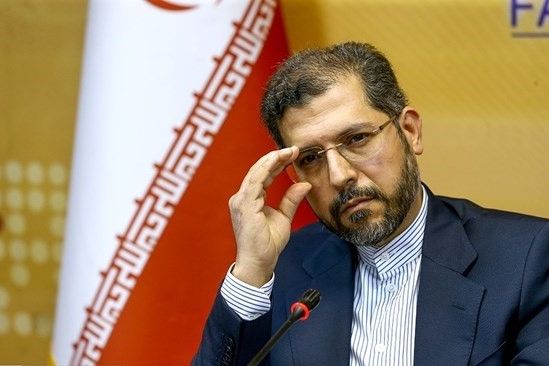
Iran’s foreign ministry said Monday that talks with Saudi Arabia have not stopped but a new round of meetings depends on Riyadh’s “serious will”.

Iran’s foreign ministry said Monday that talks with Saudi Arabia have not stopped but a new round of meetings depends on Riyadh’s “serious will”.
Saeed Khatibzadeh, spokesman of the ministry in his weekly briefing told reporters that Saudi Arabia should refrain from media comments on the talks. Saudi Foreign Minister Faisal bin Farhan Al Saud told CNBC on October 30 that talks with Iran have not stopped but have made no “solid progress”.
Iran and Saudi Arabia began talks in April, reportedly with Iraqi mediation to reduce tensions and possibly restore diplomatic relations severed since January 2016.
Iran initially made optimistic assessments of the talks but later Saudi Arabia presented a more cautious picture, which appears to have annoyed Tehran.
The hardline government of President Ebrahim Raisi has pledged to improve relations with regional countries, as the United States and its European allies have raised the issue of Tehran’s aggressive behavior in the region and have said they expect Tehran to hold talks about its regional policies.
Saudi Arabia has indicated that Iran might be interested in holding talks to ward off Western pressure.
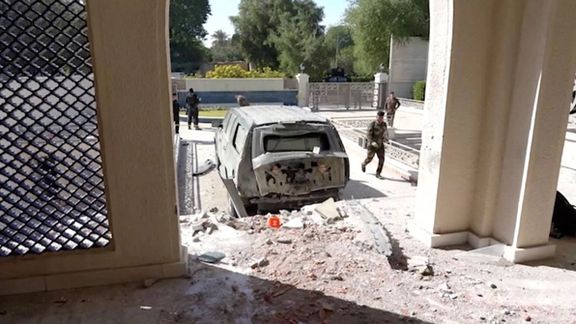
US President Joe Biden has strongly condemned the terrorist attack on the residence of Iraqi Prime Minister Mustafa al-Kadhimi. He praised Kazemi's call for calm, restraint and dialogue in Iraq.
British Prime Minister Boris Johnson in a phone call told Iraqi Prime Minister Mustafa Al-Kadhimi on Sunday he strongly condemned an attack on his home in Baghdad, Johnson's office said.
UN Secretary-General Ban Ki-moon's spokesman also said he strongly condemns the failed assassination on al-Kadhimi.
Kadhimi escaped unharmed in an assassination attempt by armed drone in Baghdad, officials said on Sunday, an incident that raised tension in the country weeks after a general election disputed by Iran-backed militia groups.
"He strongly condemned the attack on the prime minister’s home in Baghdad and offered his sympathies to those injured," Johnson's office.
"He made clear that the UK stands by the Iraqi people and supports Prime Minister Khadimi’s efforts to form a government following elections, which is vital for the long-term stability of Iraq."
Earlier on Sunday foreign secretary Liz Truss said Britain supported Kadhimi's call for calm and restraint.
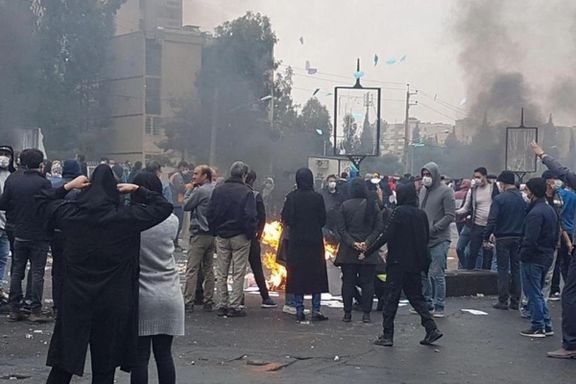
Rights activists say Iran's security forces are pressuring victims' families of November 2019 protests to make them forego commemorations for their loved ones.
Speaking to Iran International TV, rights activist Pouran Nazemi said intelligence ministry agents have threatened families that "they will be held responsible" if anything happens in anniversary ceremonies that they hold. According to Nazemi, security forces have also threatened activists, who have previously been sentenced for their political activities, that their suspended sentences will be enforced if they participate in any gatherings or ceremonies to honor the victims of the protests.
While the government has never issued an official tally of those killed and detained, non-government estimates range from 300 to 3,000 killed by security forces. The protests erupted in mid-November 2019, spreading overnight to almost every major city, when the government announced an increase in the price of gasoline amid a serious fiscal crisis and rising prices for food and other necessities.
A report by Human Rights in Iran in February claimed that at least 3,000 protesters were killed by the Islamic Republic security forces from November 15 to 17, and nearly 20,000 were arrested during and after the events often referred to as "bloody November" of 2019.
Rights activists have in recent days reported an increase in arrests of activists and government violence victims' family members in several provinces including Tehran.
Last week Gohar Eshghi, the elderly mother of the 35-year-old blogger Sattar Beheshti who was killed under torture in prison in November 2012, and two other members of the family were arrested to prevent them from holding a remembrance ceremony. Ms. Eshghi who was freed Saturday and mothers of other victims of government violence including those killed in November 2019 often hold gatherings and campaign on social media in remembrance of their children and other victims.
According to a Reuters special report published in December 2019, Iran's Supreme Leader Ali Khamenei, in a meeting with government officials on November 17, 2019, two days after protests started, ordered an end to the unrest, saying the Islamic Republic was in danger. "Do whatever is necessary to end these protests. This is my order,” Khamenei allegedly said while telling officials that he would hold them responsible if the protests did not stop immediately.
The November 2019 protests have been the most widespread against the Islamic Republic since its establishment in 1979. Authorities shut down the internet for over a week to help news of the unrest and killings from spreading to media outside Iran.
In a statement ahead of the 15 November anniversary of the protests, political activist Abolfazl Ghadiani (Qadiani), a former supporter of the Islamic Republic, said the bloody response to the November 2019 protests added a new page to the “dark and long record of killings” by Iran’s rulers. The former revolutionary who now calls Khamenei "a despot" added that most Iranians want "an end to the Supreme Leader’s monarchy”.
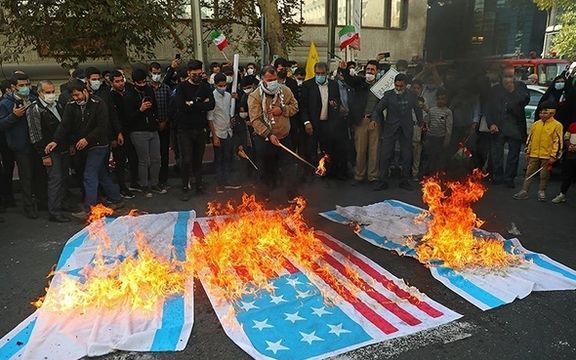
Opinion by Bryan E Leib and Dr. Daniel Jafari - "We, the American people...must always draw a line in the sand separating the Iranian people from the Iranian Regime."
-------------------------------------------------------------------------------------------------------
On Thursday, November 4th, thousands of Iranians with ties to the Iranian Regime gathered on streets of Tehran for the anniversary of the 1979 seizure of the US Embassy, chanting “Death to America” and “Death to Israel,” and burning American and Israeli flags. The US Embassy takeover triggered a 444-day hostage crisis and break in diplomatic relations that continues to this day.
Ever since the Iranian Regime took power in 1979, they have been on a mission to spread their version of Islam around the world to serve their anti-Western agenda, while also radically changing the lifestyle of the Iranian people.
The Regime has tried to achieve this through their terrorist and militant proxies such as Hamas and Palestinian Jihad in Israel, Hezbollah in Lebanon and the Houthis in Yemen. The Regime spends billions of dollars every year financing these terrorist groups with cold hard cash, missiles, weapons and training.
In addition to the funding of terrorism around the world, which by the way, the Iranian people have been protesting for years - the Regime will do whatever is needed to deny the Iranian people the benefits of basic political and social freedoms, equality and tolerance.
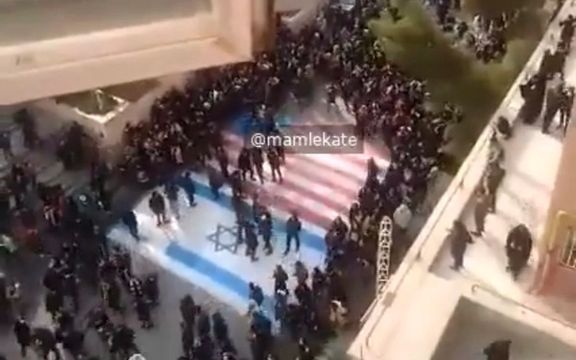
While many in the Iranian Regime and the 1% of Iran enjoy luxuries like unfettered access to the internet, access to social media, business and educational opportunities and much more - the vast majority of the Iranian people are suffering because of the corruption and misrule of the Islamic Republic, and have been for decades.
This Regime has proven time and time again that they will do whatever is necessary to maintain their grip on power. Some examples of this are:
Arresting and executing high profile citizens like Navid Afkari on trumped up charges;
Allowing honor killings that permits close relatives to execute their own family members for being gay or lesbian, or for extramarital relationships;
Turning off the internet inside Iran when the Iranian people take to the streets to protest, to ensure that the outside world can’t see what’s happening;
And when turning off the internet doesn't work, Supreme Leader Ali Khamenei gives the order to use lethal force.
Once such example was in November 2019.
The Iranian people started taking to the streets to protest against the Islamic Republic. First, the Regime turned off the internet so the people couldn't broadcast their message to the world. When that didn't work, Khamenani issued a directive to the IRGC to use lethal force on his citizens.
When the dust settled, Reuters reported that over 1,500 innocent Iranians were murdered on streets all throughout Iran.
Which brings me to the topic of this piece. We, the American people and our representatives in the Federal Government must always draw a line in the sand separating the Iranian people from the Iranian Regime.
In my (Bryan) latest op-ed in the Wall Street Journal, I discussed how the Iranian people and Iranian diaspora around the world support the Abraham Accords and they want peace with Israel and their Arab neighbors. The Iranian Regime has coordinated a smear campaign against the Abraham Accords with all Regime officials and their allies in America pouring cold water on the historic agreements at every opportunity.
The Iranian people love America, our values and our culture. The Iranian Regime has been chanting “Death to America”, burning American flags and sanctioning terrorist attacks against American forces and our allies for decades.
From our perspective, it’s very clear that most Iranians love America. We will never stop standing with the Iranian people in their fight for freedom and we hope you will stand with the Iranian people as well because they need our support now more than ever before. Stand for liberty!
Bryan E. Leib is the Executive Director of Iranian Americans for Liberty and he is a former GOP Congressional Candidate and Dr. Daniel Jafari is the President of Iranian Americans for Liberty
Opinions expressed by the authors do not necessarily reflect the views of Iran International
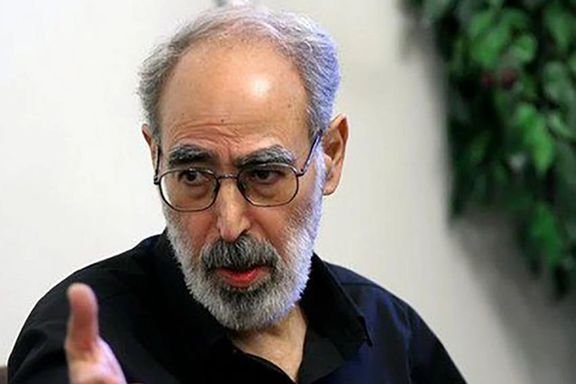
A former supporter of the Islamic Republic in a statement has accused Iran’s Supreme Leader Ali Khamenei of continuously “massacring defenseless Iranians”.
Abolfazl Ghadiani (Qadiani), who has been indicted and imprisoned in the past for criticizing Khamenei and the political system in Iran issued a statement for the second anniversary of nationwide protests in which hundreds were killed by security forces in November 2019.
Ghadiani said that the bloody response to those protests added a new page to the “dark and long record of killings” by Iran’s rulers. He added that the majority of people want to get rid of the president and put an end to “Supreme Leader’s monarchy”.
Ghadiani belonged to a leftist, revolutionary group that was supporting Khamenei until the disputed presidential election of 2009, when the Supreme Leader backed the questionable reelection of Mahmoud Ahmadinejad. Ghadiani with many others protested the results became an opposition figure.
Since 2018, Ghadiani has issued several statements calling Khamenei a despot and demanding his resignation. In June, he signed a statement with 100 other activists calling for a boycott of the presidential election, in which all important rivals to Ebrahim Raisi were barred from running.
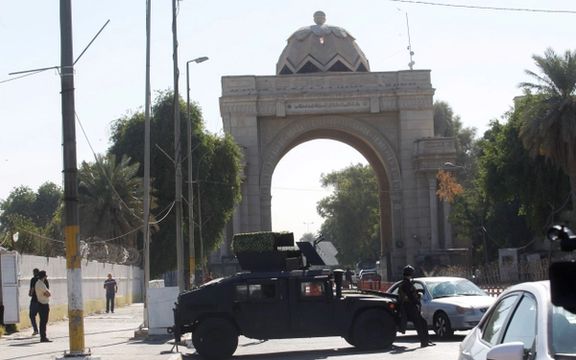
Iranian official reactions to the drone attack on the residence of Iraq’s prime minister were meant to deflect any blame and pointing fingers at unknown forces.
Social media users in Iran generally described government reactions to the incident as a way of distancing the Islamic Republic from the attempt.
Al-Kadhimi escaped the attempt and subsequently praised "the steadfastness and determination of Iraq's heroic security forces,” adding that he was "fine and among my people."
While usually the Foreign Ministry is the first to react to such incidents, the spokesman for the ministry was not that quick on Sunday and his reaction came hours past mid-day in Tehran. Saeed Khatibzadeh categorically condemned the attack and repeated Iran's formulaic statement about "Tehran's support for continued peace and stability in Iraq."
Iran's national security chief Ali Shamkhani who was quick to respond to the news, in an early morning tweet accused "foreign think tanks" of being behind the attack. Shamkhani condemned the attack, calling it "a new sedition".
Most of more than 140 Twitter users who commented on Shamkhani's tweet said, in one way or another, that the tweet was an effort to distance Iran from the attempt while many in Iran and Iraq saw the Islamic Republic's hand somewhere in the story.
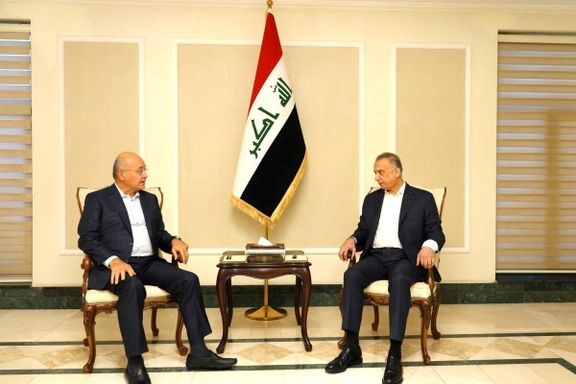
Iranian dissident scholar in France Mohammad Javad Akbarin, for instance, charged: "You wrote this tweet because you probably know that everyone knows who was behind the attack.” Akbarin also mentioned some characteristic indications in the tweet that pointed fingers at Tehran.
Iranian blogger Hamid Moeeni wrote: "When you define your strategic depth based on religion and have a special IRGC unit for it with a lot of mercenaries and take pride in your pictures being on billboards in another country, then you have to wait for such allegations. At least think of the probability of your own think tanks also being infiltrated by foreign think tanks!"
Meanwhile, Noor News, a website close to Shamkhani and Iran's Supreme Council of National Security characterized the assassination attempt as "suspicious," and an attempt to overshadow the work of the fact-finding committee that is looking into a clash between security forces and pro-Iran demonstrators on Friday.
Iran's proxy groups in Iraq who rejected the outcome of the latest parliamentary elections had threatened to take revenge. Abu Ali Al-Askari one of the figureheads of pro-Iran Kataib Hizballah said following the assassination attempt that Al-Kadhimi was pretending to be a victim in a bid to win more popularity.
Muqtada Al-Sadr, whose group won the elections called for security forces to take full control of Iraq – a thinly-veiled jab at pro-Iran militias. He reiterated his call for ending foreign influence in Iraq, also a reference to Iran. Another Iraqi figurehead Ammar Hakim also condemned the attack. Most current and former Iraqi officials including President Barham Salih and Al-Nasr Coalition Leader Hayder al-Ibadi also denounced the assassination attempt.
Noor News said that "the quick reaction of some pro-Western groups following the attack makes the event look even more suspicious," but did not explain why and did not name those groups.
In Iran, IRGC-linked news agencies Fars and Tasnim carried factual reports of the Sunday morning attack and summed up the reactions in Iran without mentioning the backdrop of hostilities of which Iran and the IRGC are known to be a part of.
The administration-owned news agency ISNA reported that Foreign Minister Hossein Amir-Abdollahian has called his Iraqi counterpart Fuad Hussain to ask about the prime minister's good health. ISNA quoted Amir-Abdollahian as saying that the attack was carried out by "sinister elements."
Official news agency IRNA featured an extensive report about the drone attack on Al-Kadhimi's residence asking whether the United States was behind the attack, but stopped short of explaining why the US would want to harm a leader who has good relations with Washington. IRNA attributed the conspiracy question to un-named Iraqi groups.
Meanwhile, it quoted a controversial Iraqi commentator as charging that US forces did not activate the anti-aircraft system over Baghdad’s green zone to stop the attack. Generally, IRNA blamed many groups and regional media outlets for being behind the attack, without mentioning pro-Iran groups. Instead, the agency quoted several pro-Iran militia leaders pointing fingers at foreign countries and media outlets.